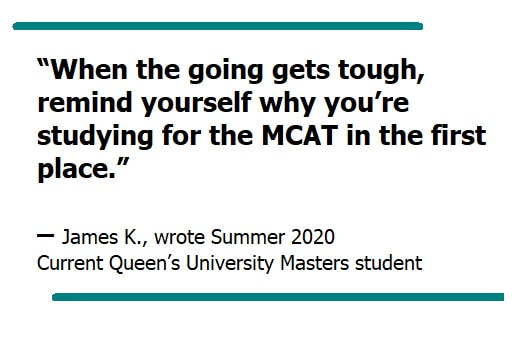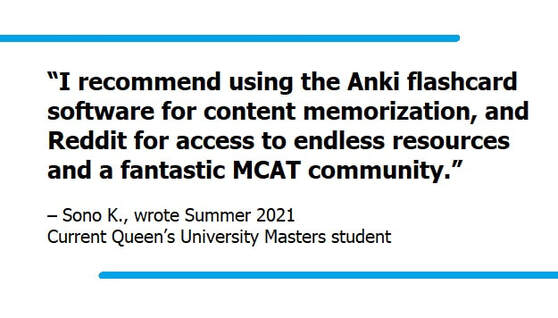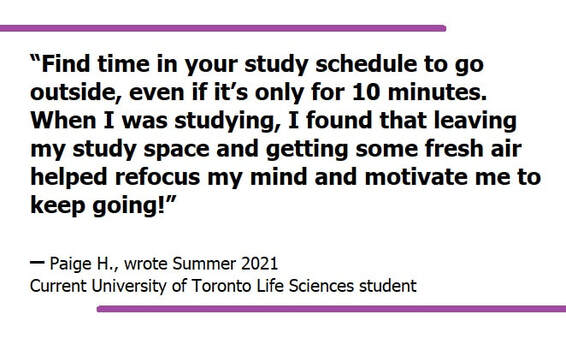|
By Trinity Vey Congratulations on choosing to write your MCAT! This is a huge step in your path towards a career in medicine. The Medical College Admission Test (MCAT) is a standardized multiple-choice test required for admission to most North American medical schools. Writing the MCAT can be overwhelming at the best of times, let alone during a pandemic. If you’re writing your test during COVID, check out the following tips to help you prepare. Photo by Green Chameleon on Unsplash Define a study schedule Step 1: Book your MCAT. Booking your test will help you build a time-based schedule with an end-date in mind. I was fortunate to be able to study full-time from May to August 2021. Based on whether you’re studying full-time or part-time, your timeline may be very different from mine! If you’re studying full-time, 3-4 months usually works well. If you’re studying part-time, I would recommend not exceeding 6 months, as you’ll likely begin to forget information or become burnt out if your study period is too long. Within your schedule, dedicate initial time to reviewing content – this took me about 6 weeks. I planned two specific chapters to do each day, which helped keep me accountable. I suggest working on a mix of your strongest and weakest subjects every day to avoid frustration. For me, this meant I paired biology with biochemistry, organic chemistry with general chemistry, and psychology with physics. Once you have gone through the material, focus on practice questions and full-length tests. Find the right resources for you Thankfully, COVID doesn’t have to limit your access to resources; there is a wide range of online tools. Companies that offer book sets and/or online prep courses include Kaplan, Princeton Review, and PREP 101. When deciding between a prep course or self-directed study, reflect on which study habits have worked best for you during your academic career. Do you learn best by reading alone, or being taught by others? Do you want some flexibility in your schedule, or would a course keep you on track? Do you have a background in sciences or is this all new content? People do exceptionally well with and without courses – it really depends on the person and their learning style! There are also many free online resources to support your studying. Khan Academy offers a great free online course with videos and practice questions. To strengthen your Critical Analysis and Reasoning Skills (CARS), Jack Westin offers free daily passages. There are many MCAT-focused YouTube channels, such as Leah4sciMCAT, which helped me master math without a calculator. I attribute a lot of my success to using the AAMC Official Prep Products, specifically the section banks, question banks, and full-length practice tests. The style of MCAT questions can take some getting used to, and practice makes perfect. Maintain motivation It’s impossible to stay motivated all the time, especially given the monotony of the pandemic; don’t be too hard on yourself when you have off days. Be proactive! Avoid burnout by taking regular breaks. Take at least one day a week completely off from studying. While planning your schedule, give yourself some wiggle room to take time off when you need it. If possible, mix up your study space by visiting coffee shops, libraries, or a friend’s house. If you’re stuck at home, try rotating between different rooms. Filling time with hobbies and socializing will help you stay motivated. Not to mention, having other commitments can make you more productive. According to Parkinson’s Law, work expands to fill the time allotted for its completion. If you give yourself all day to complete a chapter, odds are it will take all day! However, if you have a 3pm piano class or dinner plans at 5pm, you’re more likely to complete work in time. Remember that the MCAT is a “mile wide but an inch deep”. It's easy to get discouraged by how much content the MCAT covers. However, you’re not expected to know everything in extreme detail – it is multiple choice! Prepare yourself for COVID writing conditions Check out the COVID-specific regulations for your testing centre and prepare in advance. I completed all my full-length practice tests wearing a mask, so I was used to wearing one for the real thing.
Do you have a favorite study tip? Let us know in the comments or @Scientista_Talk
0 Comments
Your comment will be posted after it is approved.
Leave a Reply. |
Education BlogAbout ScientistaSubscribe!NEW!New PostsWhat's HotClick to set custom HTML
You Might Like...
Connect With UsLatest tweets |
The Scientista Foundation, Inc. All Rights Reserved © 2011-2021 | Based in NY | [email protected]
The Network for Pre-Professional Women in Science and Engineering
The Scientista Foundation is a registered 501(c)(3) -- Donate!
The Network for Pre-Professional Women in Science and Engineering
The Scientista Foundation is a registered 501(c)(3) -- Donate!








 RSS Feed
RSS Feed









